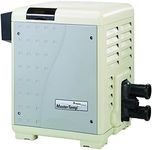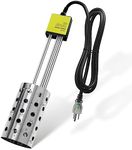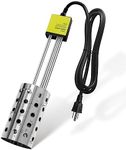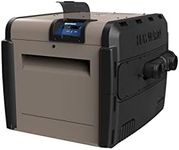Buying Guide for the Best Pool Heaters
Choosing the right pool heater can make a big difference in how much you enjoy your pool, as well as how much you spend on energy and maintenance. The best pool heater for you depends on your pool size, how often you use your pool, your climate, and your preferences for convenience and efficiency. Understanding the main features and specifications will help you make a smart choice that keeps your pool comfortable and your energy bills manageable.Heater TypePool heaters come in several types: gas (natural gas or propane), electric heat pumps, and solar heaters. Gas heaters heat water quickly and work well in any climate, making them good for pools that are used occasionally or need rapid heating. Electric heat pumps are more energy-efficient and work best in warmer climates, as they draw heat from the air. Solar heaters use the sun’s energy and are the most eco-friendly, but they depend on sunny weather and may heat water more slowly. To pick the right type, consider your local climate, how quickly you want your pool to heat up, and your interest in energy efficiency or eco-friendliness.
Heating Capacity (BTU Rating)The heating capacity of a pool heater is measured in BTUs (British Thermal Units) per hour. This number tells you how much heat the heater can produce. Smaller pools or spas may need heaters with 50,000–100,000 BTUs, while larger pools often require 200,000–400,000 BTUs or more. If you want to heat your pool quickly or have a large pool, look for a higher BTU rating. If your pool is small or you’re not in a rush, a lower BTU heater may be enough. Always match the BTU rating to your pool’s size and how fast you want it to warm up.
Energy EfficiencyEnergy efficiency tells you how much of the energy used by the heater actually goes into heating your pool water. More efficient heaters waste less energy, which can save you money and reduce your environmental impact. Efficiency is often shown as a percentage for gas heaters or as a COP (Coefficient of Performance) for heat pumps. Higher numbers mean better efficiency. If you use your pool often or want to keep running costs low, look for a heater with a high efficiency rating.
Installation RequirementsDifferent heaters have different installation needs. Gas heaters require a gas line and proper venting, heat pumps need access to electricity, and solar heaters need space for solar panels. Some heaters are easier to install than others, and some may require professional installation. Consider what utilities are available near your pool and whether you have space for the equipment. If you want a simple setup, choose a heater that matches your existing infrastructure.
Climate SuitabilitySome heaters work better in certain climates. Gas heaters perform well in any weather, while heat pumps are most efficient in mild to warm climates. Solar heaters need plenty of sunshine to work effectively. Think about your local weather: if you live in a cooler or cloudy area, a gas heater might be best. If you have lots of sun and mild temperatures, a solar or heat pump heater could be a great fit.
Maintenance NeedsAll pool heaters need some maintenance, but the amount and type can vary. Gas heaters may need regular checks for gas leaks and venting, heat pumps need their coils cleaned, and solar heaters require occasional cleaning of panels. If you prefer low-maintenance options, look for heaters known for reliability and easy upkeep. Consider how much time you’re willing to spend on maintenance when making your choice.













